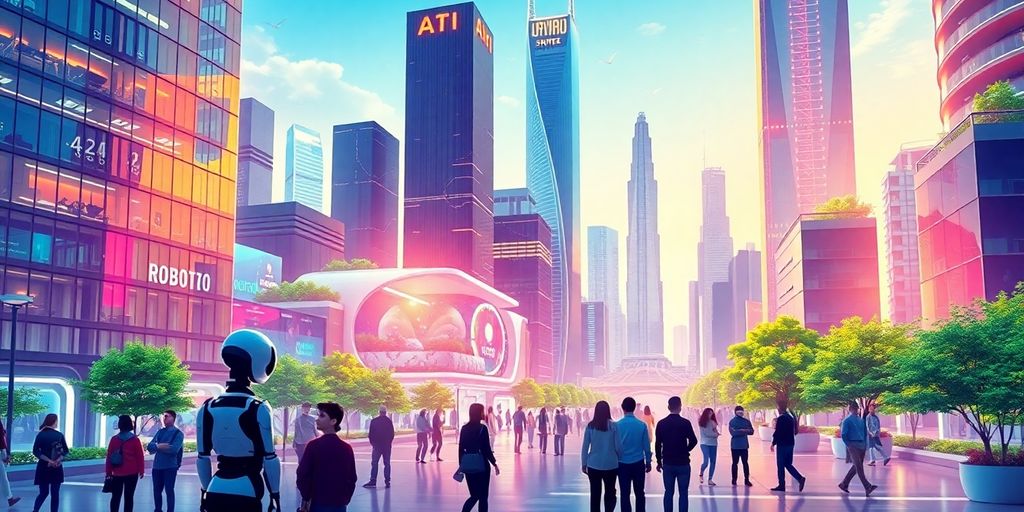In 2025, AI agents are shaking things up across industries. These digital helpers aren’t just for tech giants anymore; they’re becoming essential for businesses big and small. From customer service to supply chain management, AI agents are making their mark. They’re not just about doing tasks faster; they’re about doing them smarter. As we dive into this topic, we’ll see how AI agents are changing the game and what the future might hold.
Key Takeaways
- AI agents are becoming crucial in many industries, taking on tasks that were once manual.
- Businesses are seeing increased efficiency and cost savings thanks to AI agents.
- AI agents are not just for tech companies; they are useful in healthcare, finance, and more.
- The adoption of AI agents is expected to grow rapidly in the next few years.
- With great power comes great responsibility, and ethical considerations are key in AI deployment.
The Rise of AI Agents in 2025
Transforming Business Operations
In 2025, AI agents are no longer just a futuristic concept; they’re actively reshaping the way businesses operate. These digital powerhouses are taking on roles that once required entire teams. Imagine having an AI agent negotiating with suppliers, optimizing supply chains, and drafting reports—all while you’re focusing on your next big strategy. Companies that integrate AI agents are witnessing efficiency gains that make traditional methods seem outdated.
- AI agents can handle complex negotiations with vendors, ensuring better terms and reducing costs.
- They streamline supply chain processes, minimizing delays and improving overall efficiency.
- With AI agents, businesses can automate routine tasks, allowing employees to focus on more strategic activities.
Enhancing Customer Experience
AI agents are not just about efficiency; they’re also transforming customer interactions. By 2025, these agents are capable of managing customer service operations with unprecedented precision. They can understand and respond to customer queries in real-time, offering solutions that are both quick and accurate.
- AI agents provide 24/7 customer support, ensuring that queries are resolved promptly.
- They personalize interactions based on customer data, enhancing satisfaction and loyalty.
- With their ability to learn from interactions, AI agents continuously improve their service quality.
Driving Innovation Across Sectors
The impact of AI agents extends beyond business operations and customer service. They’re driving innovation across various sectors, from healthcare to finance. These agents can identify market opportunities that humans might overlook, offering insights that fuel growth and development.
- In healthcare, AI agents assist in diagnosing diseases and personalizing treatment plans.
- Financial services benefit from AI agents through fraud detection and risk management.
- In manufacturing, AI agents optimize production processes and reduce waste.
As AI agents become more integrated into our daily lives, they’re not just changing how we do business; they’re redefining what’s possible. Their ability to learn and adapt means that the potential for innovation is limitless. AI experts Thomas H. Davenport and Randy Bean emphasize that these trends are just the beginning, with AI agents poised to become even more influential in the years to come.
AI Agents: A Catalyst for Industry Transformation

Revolutionizing Enterprise Management
AI agents are reshaping how businesses operate, especially when it comes to managing enterprises. These intelligent systems take over mundane tasks, allowing employees to focus on more strategic roles. By automating routine processes, AI agents boost efficiency and reduce operational costs. Imagine a company where AI handles scheduling, data entry, and even initial customer interactions. This not only speeds up operations but also minimizes human error. In 2025, many companies are expected to adopt AI solutions to streamline their workflows and enhance productivity.
Streamlining Supply Chain Processes
Supply chains are the backbone of any industry, and AI agents are making them even stronger. These agents analyze data in real-time to predict demand, manage inventory, and optimize logistics. For instance, AI can anticipate when a product will run out and automatically reorder it, ensuring that shelves are always stocked. This level of automation reduces waste and improves customer satisfaction. As a result, businesses can respond faster to market changes, making them more agile and competitive.
Optimizing Resource Allocation
Resource allocation is a critical aspect of any business, and AI agents are stepping in to make it more efficient. These systems analyze vast amounts of data to determine the best way to allocate resources like time, money, and personnel. By doing so, they help businesses make informed decisions that maximize output while minimizing costs. AI agents can identify patterns and trends that humans might miss, allowing for more strategic planning and execution. This leads to better resource management and, ultimately, a stronger bottom line.
As industries continue to evolve, AI agents are becoming indispensable tools for businesses seeking to stay ahead of the curve. Their ability to transform operations and drive efficiency is unmatched, making them a key component of modern enterprise strategies.
In 2025, AI agents are set to revolutionize workflows across various industries. The focus is on developing scalable and value-driven AI solutions, providing enterprise leaders with essential strategies to harness this transformative technology. Learn more about scalable AI solutions.
Vertical AI Agents: Tailored Solutions for Every Industry
AI agents are becoming the new must-have tool across various sectors, offering specific solutions tailored to meet industry needs. This trend is similar to the rise of vertical AI agents, which are designed to handle repetitive and labor-intensive tasks, providing a measurable impact on efficiency and productivity.
Specialized Tools for Healthcare
Healthcare is seeing a significant transformation with AI agents. These tools are helping doctors diagnose diseases faster and more accurately by analyzing medical data. AI agents can predict patient outcomes, thereby assisting in creating personalized treatment plans. Hospitals are using AI to manage patient records, streamline administrative tasks, and even assist in surgeries with robotic precision.
AI in Financial Services
In the financial sector, AI agents are revolutionizing how services are delivered. They are used for fraud detection by analyzing transaction patterns and identifying anomalies. Automated financial advice is becoming more common, helping clients make informed investment decisions. AI agents also play a role in risk management, where they assess market conditions and predict potential financial downturns.
Automating Manufacturing Processes
Manufacturing is another area where AI agents are making a big difference. They are used to monitor production lines, ensuring that everything runs smoothly. Predictive maintenance is a key feature, where AI agents predict equipment failures before they happen, reducing downtime. These agents also help in optimizing supply chains by analyzing logistics data and suggesting improvements.
As industries continue to integrate AI agents, the focus is on creating solutions that are not only efficient but also adaptable to the unique challenges each sector faces. The future of AI is not just about automation; it’s about creating smarter and more responsive systems that can evolve with industry needs.
The Future of AI Agents: Trends and Predictions
By 2025, AI agents are expected to become a staple across various sectors, with their adoption rates climbing steadily. Businesses are recognizing the potential of these agents to streamline operations and improve decision-making processes. AI agents are not just tools but integral components of modern enterprises. As industries continue to shift towards digital transformation, the reliance on AI agents will only grow.
- Enterprises deploying AI agents are projected to rise from 25% in 2025 to 50% by 2027.
- Small language models are becoming more prevalent, allowing for more efficient and adaptable AI solutions.
- The focus is shifting from model-centric to systems-centric thinking, emphasizing the integration of AI into broader business ecosystems.
AI agents are designed to complement human efforts, not replace them. The future points towards a more collaborative environment where AI agents and humans work in tandem to achieve better outcomes. This partnership is essential for maximizing the benefits of AI.
- AI agents handle repetitive tasks, freeing up humans for more strategic roles.
- Improved interfaces make interactions between AI and humans more intuitive and productive.
- Companies are investing in training programs to help employees work effectively alongside AI agents.
As AI agents become more ubiquitous, addressing ethical and security concerns is paramount. Ensuring that AI operates within ethical boundaries and is secure from malicious attacks is crucial for gaining public trust.
- Organizations are prioritizing the development of AI security measures to protect sensitive data.
- Ethical guidelines are being established to prevent misuse of AI technologies.
- Greater recognition of human roles in AI development ensures that ethical considerations are integrated from the outset.
The integration of AI agents into daily operations is not without challenges, but the potential benefits far outweigh the risks. As we move forward, balancing innovation with responsibility will be key to harnessing the true power of AI agents.
For more insights on predictions for AI in 2025, including the shift towards smaller language models and enhanced security focus, explore the latest industry analyses.
Challenges and Opportunities in AI Agent Deployment
Addressing Energy Consumption
AI agents are great, but they sure do suck up a lot of power. With the increasing use of Generative AI, energy demands are skyrocketing. Deloitte says global data center electricity consumption might double by 2030, which is wild. This means we need to think about energy-efficient technologies and sustainable practices to keep things in check.
Ensuring Data Privacy and Security
Data privacy and security are big deals when it comes to AI agents. As these systems become more autonomous, questions around decision-making ethics, privacy, and security pop up. Building strong frameworks to tackle these issues is super important for responsible AI deployment. Nobody wants their data mishandled, right?
Overcoming Technical Barriers
Deploying AI agents isn’t all sunshine and rainbows. There are technical barriers to consider, like integration complexities and high implementation costs. Businesses need to navigate these hurdles to make the most out of AI agents. Investing in AI infrastructure and focusing on sustainability can help. Plus, developing guidelines for ethical AI practices ensures these agents operate within the right boundaries.
AI agents are not just tools for automation; they are gateways to a smarter, more efficient world. By addressing associated challenges and strategically investing in AI capabilities, businesses can harness the full potential of AI agents, paving the way for a more intelligent future.
AI Agents in Action: Real-World Applications
Customer Service and Support
AI agents are shaking up the customer service scene. Imagine calling a help center and getting your answers without waiting forever. That’s what AI agents are doing—they’re like supercharged customer reps who never sleep. They handle tons of questions at once, and they learn from each interaction to get better over time. Companies are noticing huge jumps in customer satisfaction because these agents can solve problems faster and even predict what you might need next.
Enterprise Workflow Automation
In big companies, AI agents are taking over the boring tasks. They’re like the ultimate office assistants, managing everything from scheduling to data entry without getting tired or making mistakes. This frees up real human employees to focus on more important stuff, like coming up with new ideas or tackling complex problems. By 2028, it’s expected that a third of enterprise software will have AI agent capabilities, making daily decision-making smoother and more efficient.
Government and Public Sector Innovations
AI agents are also stepping into government offices, helping to cut through red tape. They’re speeding up processes like renewing licenses or approving documents, which means less waiting for citizens and more efficient public services. Pilot programs have shown a 25% increase in citizen satisfaction because things just get done quicker. It’s like having a digital assistant that helps streamline everything, making government services more accessible and user-friendly for everyone.
The Economic Impact of AI Agents by 2025

Boosting Global GDP
AI agents are not just reshaping industries; they’re giving the global economy a serious boost. By 2025, these smart systems are expected to add trillions to the global GDP. Imagine AI agents working tirelessly behind the scenes, streamlining operations and discovering new efficiencies that humans might miss. They’re the unsung heroes of economic growth, quietly pushing productivity to new heights. This economic surge isn’t just a prediction—it’s already happening as AI integrates more deeply into business operations.
Creating New Job Opportunities
While there’s a lot of talk about AI taking jobs, it’s also creating them. As industries adapt to using AI agents, new roles are emerging that didn’t exist before. Think about all the people needed to develop, maintain, and improve these AI systems. Plus, as AI takes over repetitive tasks, humans can focus on more creative and strategic roles. It’s a shift in the job market, sure, but one that opens up possibilities for innovation and growth.
Driving Cost Efficiencies
AI agents are masters of efficiency. They cut down on waste, reduce errors, and optimize processes like never before. This isn’t just about saving money—it’s about making businesses more competitive. By lowering costs, companies can offer better prices to consumers, invest in new technologies, or expand their operations. It’s a ripple effect that starts with AI agents and spreads throughout the economy.
As AI agents become more prevalent, their impact on the economy will only grow. They’re not just tools; they’re partners in progress, helping businesses and economies thrive in ways we couldn’t have imagined just a few years ago.
In essence, AI agents are setting the stage for a future where economic growth is fueled by technology, innovation, and a new way of thinking about work.
Partnering with AI Consulting Firms for Success
Identifying Suitable AI Solutions
When you’re looking to integrate AI into your business, figuring out where to start can be overwhelming. This is where AI consulting firms come in handy. They can help pinpoint the exact AI solutions that align with your business needs. Whether it’s streamlining operations or enhancing customer interactions, these experts can guide you in the right direction. Choosing the right AI tool can make or break your strategy, so it’s crucial to get it right from the start.
Developing Tailored AI Strategies
Once you’ve identified the potential AI solutions, the next step is crafting a strategy that’s tailored to your business. AI consulting firms excel in this area, offering insights and expertise to ensure your AI deployment is not just effective but also sustainable. They work closely with your team to understand your goals and challenges, creating a roadmap that aligns AI capabilities with your business strategy.
Implementing Effective AI Tools
Finally, implementing AI tools is where the rubber meets the road. An AI consulting firm ensures that the transition from planning to execution is smooth. They assist in setting up the infrastructure, training your team, and monitoring the AI systems to ensure they’re functioning as intended. By partnering with experts, businesses can avoid common pitfalls and ensure their AI tools are delivering the desired outcomes.
Partnering with an AI consulting firm can be a game-changer for businesses looking to harness the power of AI. With expert guidance, companies can navigate the complexities of AI adoption, ensuring a seamless integration that drives growth and innovation.
In today’s fast-paced world, aligning with the right corporate culture is essential to stay ahead. AI consulting firms help businesses not only adapt but thrive in this evolving landscape.
Conclusion
So, here we are, staring at a future where AI agents are not just a part of the tech landscape but are reshaping it entirely. By 2025, these digital helpers are set to become as common in businesses as email or spreadsheets. They’re already making waves, handling tasks that used to need a human touch, and doing it faster and often better. Sure, there are challenges, like figuring out how to keep them ethical and energy-efficient, but the potential benefits are huge. As companies dive deeper into this AI-driven world, those who adapt quickly will likely find themselves ahead of the game. It’s an exciting time, and while we can’t predict everything, one thing’s for sure: AI agents are here to stay, and they’re going to change the way we work and live.
Frequently Asked Questions
What are AI agents?
AI agents are smart computer programs that can learn and make decisions on their own. They’re like digital helpers that can do tasks without needing a lot of human guidance.
How do AI agents help businesses?
AI agents help businesses by doing things like managing customer service, organizing data, and finding new opportunities. They make work faster and easier.
Can AI agents work with people?
Yes, AI agents can work with people. They are designed to assist and communicate with humans to make tasks easier and more efficient.
Are AI agents safe to use?
AI agents are generally safe, but it’s important to make sure they respect privacy and security rules. Companies should use them responsibly.
What industries use AI agents?
Many industries use AI agents, including healthcare, finance, and manufacturing. They help improve services and make processes more efficient.
Will AI agents replace human jobs?
AI agents might change some jobs, but they also create new opportunities. They can handle repetitive tasks, allowing people to focus on more important work.




